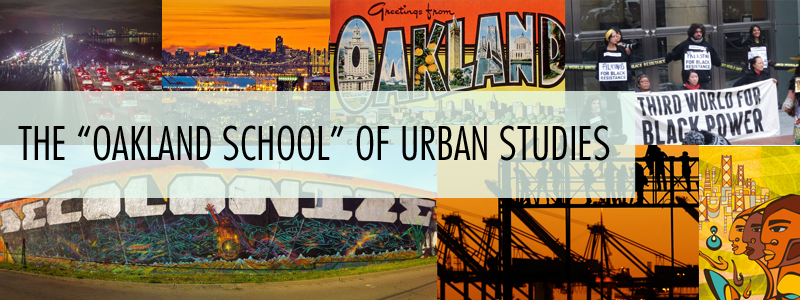The Locatedness of Gentrification as Process and Theory
by Alex Werth
The idea of an “Oakland School” of urban studies is a source of controversy within our working group. It means different things to different people—at times positive, others negative. Thank goodness. This difference is what draws me into our dialogue. It gives me hope that new ways of engaging with the city in thought and practice—ones that are ultimately more nuanced, accountable, and useful—are possible.
To me, the idea of an “Oakland School” is meant to put this dialogue, and the controversy it necessarily entails, at the center of any attempt to formulate knowledge about a place as complex and contested as Oakland (especially given the disparities within our group and, as graduate students, between us and most of the population at large). Rather than claim a comprehensive and authoritative account, it points to the partial and provisional nature of any attempt to make sense of the city in the midst of rapid transformation. Referring with a nod and a wink to the so-called Chicago and L.A. Schools, the name ironizes the tendency within the social sciences to exalt a specific metropolitan area as a sign of “the urban” as a universal and singular entity. To me, the “Oakland School” is about resisting rather than replicating that tendency. Our aim is not to represent this place to itself (a task as useless as it is irresponsible). Nor is to spotlight it as a model or example to folks from elsewhere. Rather, it is to discuss the contested and contingent nature of the processes of not only urban change in Oakland, but also producing knowledge about this place (and the relationships it entails). To that end, I see the issue of locatedness—in terms of both urban process and theory—as essential. And this is why I see the “Oakland School” as a blessing: it allows me to engage with a group of talented and committed scholars around a common object of study in ways that cross social and disciplinary lines.
This issue of interdisciplinarity was in full effect at our November meeting, at which we discussed gentrification and displacement. I have received most of my academic training in the urban social sciences. In disciplines such as geography, sociology, and planning, scholars have primarily focused on gentrification as a window into the restructuring of urban society and space—as geographical evidence, taken in large part from Western Europe and North America, of changes in the class and profit-making structure of post-industrial capitalism. But in our discussion it became clear that this orientation towards present/emergent time, and on class and capital as supposed universals, has the potential to obscure as much as it reveals. For instance, Savannah Kilner noted that the common use of “colonization” as a metaphor for the gentrification of working-class districts can displace attention from the ongoing nature of settler colonialism in places like Oakland. In a similar vein, Andrea Miller pointed out that, in the context of contemporary struggles against displacement, the discourse of native-ness (as in, “I’m an Oakland native”) works to “normalize the settler,” further eliding indigenous dispossession and erasure.
This, for me, gets at the heart of the locatedness of urban process and theory. Since the 1970s, popular and academic accounts of gentrification have been animated by repeated references to clashes between “pioneers” and “natives” on the “urban frontier” as stand-ins for racial and class encounters and conflicts. In so doing, however, they have ignored the concrete geographies and bodies made and unmade through U.S. colonial conquest. The late geographer Neil Smith’s canonical text The New Urban Frontier exemplifies this tendency. Treating the “frontier” as a universal terrain of capital accumulation that spans time and space—rather than as set of specific geographies, with specific histories of racialized violence—Smith reduces the contingency of urban struggles to a singular fight against the restructuring of capitalism. But as consequential as that restructuring may be, we cannot lose site of the way it collides with and compound other trajectories of dispossession.
For these and other insights, I am grateful to my colleagues (as well as local activists). I believe that such perspectives point to the locatedness of gentrification in ways that, for me, indicate the value of our dialogue as an “Oakland School.”
